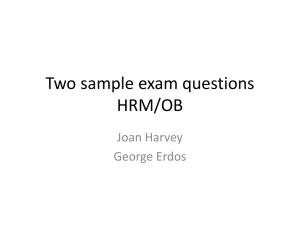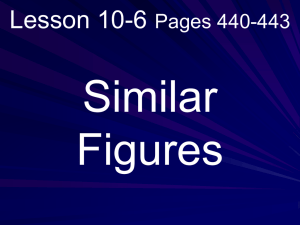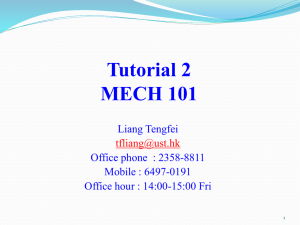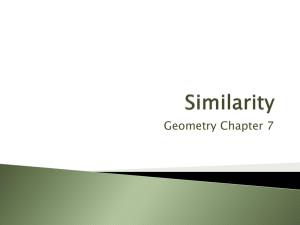C - LtoJ Consulting
advertisement
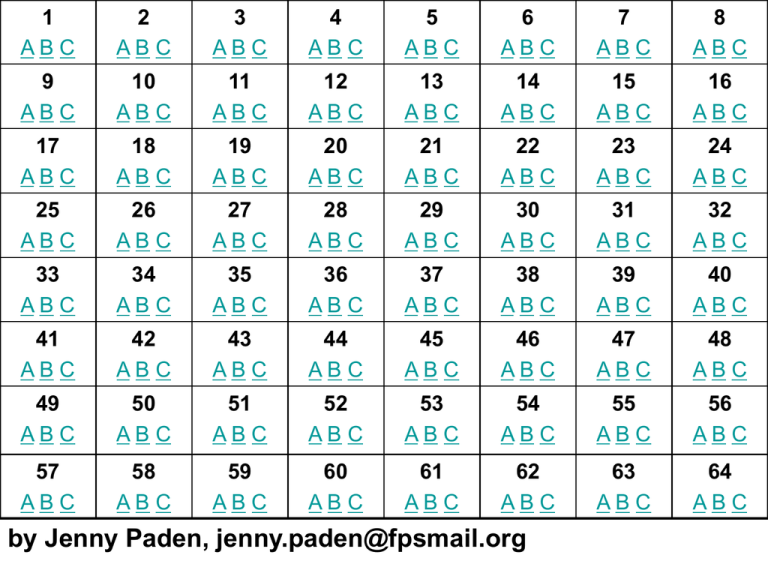
1 ABC 2 ABC 3 ABC 4 ABC 5 ABC 6 ABC 7 ABC 8 ABC 9 ABC 10 ABC 11 ABC 12 ABC 13 ABC 14 ABC 15 ABC 16 ABC 17 ABC 18 ABC 19 ABC 20 ABC 21 ABC 22 ABC 23 ABC 24 ABC 25 ABC 26 ABC 27 ABC 28 ABC 29 ABC 30 ABC 31 ABC 32 ABC 33 ABC 34 ABC 35 ABC 36 ABC 37 ABC 38 ABC 39 ABC 40 ABC 41 ABC 42 ABC 43 ABC 44 ABC 45 ABC 46 ABC 47 ABC 48 ABC 49 ABC 50 ABC 51 ABC 52 ABC 53 ABC 54 ABC 55 ABC 56 ABC 57 ABC 58 ABC 59 ABC 60 ABC 61 ABC 62 ABC 63 ABC 64 ABC by Jenny Paden, jenny.paden@fpsmail.org 1A Draw segment AB and ray CD A C B D 1B Name a four coplanar points Points A, B, C, D 1C Name a pair of opposite rays: CB and CD 2A M is the midpoint of PR, PM = 2x + 5 and MR = 4x – 7. Solve for x. x=6 2B 3x 4x + 8 29 Solve for x x=3 2C E 6x – 4 F 3x 5x + 8 E, F and G represent mile markers along a straight highway. Find EF. EF = 14 G 3A L is in the interior of JKM. Find m JKM if m JKL = 32º and m LKM = 47o. mJKM = 79o 3B BD bisects ABC, m ABD = (4x - 3)º, and m DBC = (2x + 7)º. Find m ABD. m ABD = 17 3C QS bisects PQR, m PQS = (2y + 1)º, and m PQR = (y + 12)º. Find y. y = 10/3 = 3.3 4A 1 2 Angles 1 and 2 are called: A. Vertical Angles B. Adjacent Angles C. Linear Pair D. Complementary Angles B. Adjacent Angles 4B 1 2 Angles 1 and 2 are called: A. Vertical Angles B. Adjacent Angles C. Linear Pair D. Complementary Angles A. Vertical Angles 4C 1 2 Angles 1 and 2 are: A. Adjacent B. Linear Pair C. Adjacent and Linear Pair D. Neither C. Adjacent and Linear Pair 5A The supplement of a 84o angle is _____o 96o 5B The complement of a 84o angle is _____o 6o 5C 37.2o Find the complement of the angle above. 52.8o 6A Find the perimeter and area of a square with side length of 5 inches Perimeter: 20 inches Area: 25 inches2 6B 14 6 12 What is the perimeter and area of the triangle above? Perimeter = 32 Area = 36 6C Find the circumference and area of a circle with a diameter of 10. Round your answer to the nearest tenth. Circumference: 31.4 Area: 78.5 7A State the Distance Formula x2 x1 y2 y1 2 2 7B Find the distance of (-1, 1) and (-3, -4) 29 5.39 7C Find the length of FG Answer: 5 8A Find the midpoint of (-4, 1) and (2, 9) (-1, 5) 8B Find the midpoint of (3, 2) and (-1, 4) (1,3) 8C Find the midpoint of (6, -3) and (10, -9) (8, -6) 9A BC and JE are called _____ lines: A. Perpendicular B. Parallel C. Skew D. Coplanar Answer: C. Skew 9B BF and FJ are _______. A. Perpendicular B. Parallel C. Skew A. Perpendicular 9C BF and EJ are _______. A. Perpendicular B. Parallel C. Skew B. Parallel 10A 1 2 1 and 2 are called _____ angles. A. Alternate Interior B. Corresponding B. Corr. C. Alternate Exterior D. Same Side Interior 10B x° Find x. 48° x = 132o 10C Find the measure of each angle. 1 = 115o, 2 = 115o 3 = 148o, 4 = 148o 11A Find x. x = 22 11B 6x +10 4x + 20 Find x. x = 15 11C 6x +10 4x + 20 Find x. x=5 12A Given line segment XY, what construction is shown: Perpendicular Bisector 12B a)Name the shortest segment from A to CB b)Write an inequality for x. a) AP b) x > 20 12C a) Name the shortest segment from A to CB b) Write an inequality for x. a) AB b) x < 17 13A Classify the triangle by its angles AND sides. Acute isocseles 13B Classify the triangle by its angles AND sides. Equilateral and Equiangular (or Acute) 13C Classify the triangle by its angles AND sides. Obtuse Isosceles 120º 30º 14A Find y. y=7 14B A manufacturer produces musical triangles by bending steal into the shape of an equilateral triangle. How many 3 inch triangles can the manufacturer produce from a 100 inch piece of steel? 11 Triangles 14C Find the length of JL. JL = 44.5 15A 115º 36º Find x. x = 29 xº 15B 47 Find x. x = 74 27 x 15C 4x + 10° Find x. 5x - 60° x = 22 x + 10° 16A A Triangles ABC DEF Find x. D 43o 47o B C 2x + 3 = 47 2x = 44 x = 22 2x +3 E F 16B The triangles are congruent. Find x. x=4 16C Find y. y = 64o 17A Name the five “Shortcuts” to Proving Triangles are Congruent. SSS, SAS, ASA, AAS, and HL 17B Are the triangles congruent? If so, state the congruence theorem to explain why triangles are congruent. Yes, AAS 17C Are the triangles congruent? If so, state the congruence theorem to explain why triangles are congruent. Yes, SSS 18A What does CPCTC stand for? Corresponding Parts of Congruent Triangles are Congruent 18B Yes, CPCTC 18C Given the triangles, is A P? Yes, CPCTC 19A Find x x = 70o 19B Find x. x = 72o 19C Find x. x = 14 20A Which Property of Equality is shown here? 2x + 3 = 10 2x = 7 Subtraction Property of Equality 20B Which Property of Equality is shown here? 2x = 10 x=5 Division Property of Equality 20C Write a two column Proof for the following Algebra Equation. 3(t – 5) = 39 Statements 1. 3(t-5)=39 2. 3t – 15 = 39 3. 3t = 54 4. t = 18 Reasons 1. Given 2. Distributive 3. Addition Prop. Of Equal. 4. Division Prop. Of Equal. 21A Identify the property that justifies the following statement. DC DC Reflexive Property of Congruence 21B Identify the property that justifies the following statement. m1 m2, and m2 m3. So m1 m3 Transitive Property of Equality 21C a = b, so b = a Symmetric Property of Equality 22A Complete the following proof Given: KLJ MLJ , K M Prove: KL ML Statements Reason 1. KLJ MLJ , K M 1. Given 2. 3. JL JL KLJ MLJ 4. KL ML 2. Reflexive 3. AAS 4. CPCTC 22B Complete the following proof Given: B is the midpoint of DC AD AC Prove: DAB CAB Statements D Reasons A B 1. B is the midpoint of DC 1. Given 2. DB BC 2. Def of Midpoint 3. BA BA 3. Reflexive 4. AD AC 4. Given 5. DAB CAB 5. SSS C 22C Complete the missing statements. Given: W is the midpnt of XZ , XY ZY Prove: X Z Statements Reasons 1. W is the midpnt of XZ 1. Given 2. XW WZ 2. Def of Midpoint 3. XY ZY 3. Given 4. 4. Reflexive WY WY 5. WYX WZY 6. X Z 5. SSS 6. CPCTC Type answer here 23A Find x and UT x = 6.5, UT = 28.5 23B Find a and mMKL a = 6, mMKL = 38o 23C Fill in the Blank. The Perpendicular Bisector Theorem If a point is on the perpendicular bisector of a segment, then it is __________ from the endpoints of the segment. Equidistant 24A Find GC. 13.4 24B Find GM. 14.5 24C Segments QX and RX are angle bisectors. Find the distance from x to PQ 19.2 25A Fill in the blank. A _____________ of a triangle is a segment whose endpoints are a vertex of the triangle and the midpoint of the opposite side. A. B. C. D. Altitude Median Median Angle Bisector Perpendicular Bisector 25B In ∆LMN, S is the Centroid of the triangle. RL = 21 and SQ =4. Find LS. LS = 14 25C Z is the Centorid of the triangle. In ∆JKL, ZW = 7, and LX = 8.1. Find KW. 1 1 KW = 21 26A Given that DE is the midsegment find the length of AC A D 7 in. C 14 inches E B 26B Find mEFD o 26 26C Find the value of n. 2(n + 14) = 3n + 12 2n + 28 = 3n + 12 n = 16 27A Write the angles in order from smallest to largest. F , H , G 27B Write the sides in order from shortest to longest. mR = 180° – (60° + 72°) = 48° PQ, QR, PR 27C Tell whether a triangle can have sides with the given lengths. Explain. 7, 10, 21 No: 7+10 = 17 NOT greater than 21 28A Compare mBAC and mDAC. mBAC > mDAC 28B Compare EF and FG. mGHF = 180° – 82° = 98° EF < GF 28C Find the range of values for k. 5k – 12 < 38 k < 10 5k – 12 > 0 k < 2.4 29A Simplify the radical 24 2 6 29B Simplify the radical 12 2 4 3 2 3 3 2 2 29C Simplify the radical 200 100 2 10 2 30A Simplify the radical 3 8 3 8 24 4 6 2 6 6 8 8 8 4 8 8 30B Simplify the radical 4 3 2 4 3 4 3 16 3 48 30C Simplify the radical 5 3 2 5 5 25 3 3 3 31A Find the value of x. Leave your answer in simplified form. a2+ b2 = c2 22 + 62 = x2 4 + 36 = x2 40 = x2 40 4 10 2 10 31B Find the value of x. Leave your answer in simplified form. x a2+ b2 = c2 52 + 122 = x2 25 + 144 = x2 169 = x2 13 = x 31C Find the value of x. Leave your answer in simplified form. a2+ b2 = c2 52 + x2 = 102 25 + x2 = 100 X2 = 75 25 3 5 3 x 10 5 if the measures can be the side 32A Tell lengths of a triangle. If so, classify the triangle as acute, obtuse, or right. 7, 12, 16 a2 122 ? + b2 = c2 + ? 2 7 = 162 ? 144 + 49 = 256 193 < 256 Since a2 + b2 < c2, the triangle is obtuse. 32B Tell if the measures can be the side lengths of a triangle. If so, classify the triangle as acute, obtuse, or right. 3.8, 4.1, 5.2 a2 + 3.82 b2 + ? = c2 ? 2 4.1 = 5.22 ? 14.44 + 16.81= 27.04 31.25 > 27.04 Since a2 + b2 > c2, the triangle is acute. 32C Tell if the measures can be the side lengths of a triangle. If so, classify the triangle as acute, obtuse, or right. 4, 3, 5 a2 42 + + b2 ? 2 3 = ? = c2 52 ? 16 + 9= 25 25 = 25 Since a2 + b2 = c2, the triangle is right. 33A Find x. 33B Find x Rationalize the denominator. 33C Find the values of x and y. Leave your answer in simplest radical form. 22 = 2x Hypotenuse = 2(shorter leg) 11 = x Divide both sides by 2. Substitute 11 for x. 34A A polygon with 8 sides is called a(n): a. Pentagon b. Quadrilateral c. Octagon d. Heptagon C. Octagon 34B What is the name of this polygon. Pentagon 34C A polygon with 10 sides is called a _________________. Decagon 35A Find the sum of the interior angle measures of a convex heptagon. (n – 2)180° Polygon Sum Thm. (7 – 2)180° A heptagon has 7 sides, so substitute 7 for n. 900° Simplify. 35B Find the measure of each interior angle of a regular decagon. (n – 2)180° Polygon Sum Thm. (10 – 2)180° = 1440° Substitute 10 for n and simplify. The int. s are , so divide by 10. 35C Find the measure of each exterior angle of a regular 20-gon. measure of one ext. = 36A Which is NOT property of all parallelograms a. Two pairs of parallel opposite sides. b. One pair of parallel and congruent opposite sides c. Two pairs of congruent opposite sides d. Four congruent angles D. Four Congruent Angles 36B A quadrilateral with four congruent sides AND four congruent angles is called a(n) _____________. Square 36C If a quadrilateral has one pair of opposite sides are parallel but NO right angles. Which shape could it be? a. Rhombus, square b. Square, trapezoid c. Rectangle, quadrilateral d. Quadrilateral, trapezoid D. Quadrilateral, Trapezoid 37A A parallelogram with 4 congruent sides, but the angles are not congruent is a(n): a. Rhombus b. Rectangle c. Trapezoid d. Square A. Rhombus 37B A parallelogram with 4 congruent sides and 4 congruent angles is a(n): a. Rhombus b. Rectangle c. Trapezoid d. Square D. Square 37C A square might also be called. I. Rectangle II. Rhombus III. Parallelogram a. I and II only c. II and III b. I and III only d. I, II, and III D. I, II, and III 38A In kite ABCD, mDAB = 54°, and mCDF = 52°. Find mBCD. mBCD + mCBF + mCDF = 180° mBCD + mCBF + mCDF = 180° mBCD + 52° + 52° = 180° mBCD = 76° 38B Find mA. mC + mB = 180° 100 + mB = 180 Same-Side Int. s Thm. Substitute 100 for mC. mB = 80° A B Subtract 100 from both sides. Isos. trap. s base mA = mB Def. of s mA = 80° Substitute 80 for mB 38C JN = 10.6, and NL = 14.8. Find KM. KM = JN + NL KM = 10.6 + 14.8 = 25.4 39A Sole the proportion. 7(72) = x(56) 504 = 56x x=9 Cross Products Property Simplify. Divide both sides by 56. 39B Solve the proportion. 2y(4y) = 9(8) 8y2 = 72 Cross Products Property Simplify. y2 = 9 Divide both sides by 8. y = 3 Find the square root of both sides. y = 3 or y = –3 Rewrite as two equations. 39C Marta is making a scale drawing of her bedroom. Her rectangular room is 12.5 feet wide and 15 feet long. On the scale drawing, the width of her room is 5 inches. What is the length? 5(15) = x(12.5) 75 = 12.5x x=6 Cross Products Property Simplify. Divide both sides by 12.5. 40A Determine whether the polygons are similar. If so, write the similarity ratio and a similarity statement. rectangles ABCD and EFGH A E, B F, C G, and D H. All s of a rect. are rt. s and are . Thus the similarity ratio is , and rect. ABCD ~ rect. EFGH. 40B Determine whether the polygons are similar. If so, write the similarity ratio and a similarity statement. Since no pairs of angles are congruent, the triangles are not similar. 40C Find the length of the model to the nearest tenth of a centimeter. 5(6.3) = x(1.8) Cross Products Prop. 31.5 = 1.8x Simplify. 17.5 = x Divide both sides by 1.8. 41A Explain why the triangles are similar and write a similarity statement. mC = 47°, so C F. B E Therefore, ∆ABC ~ ∆DEF by AA ~. 41B Are the triangles similar. If so name the postulate or theorem. Therefore ∆PQR ~ ∆STU by SSS ~. 41C Are the triangles similar. If so name the postulate or theorem. TXU VXW by the Vertical Angles Theorem. Therefore ∆TXU ~ ∆VXW by SAS ~. 42A Find US Substitute 14 for RU, 4 for VT, and 10 for RV. US(10) = 56 Cross Products Prop. Divide both sides by 10. 42B Find PN Substitute in the given values. 2PN = 15 PN = 7.5 Cross Products Prop. Divide both sides by 2. 42C Find PS and SR Substitute the given values. 40(x – 2) = 32(x + 5) Cross Products Property 40x – 80 = 32x + 160 Distributive Property x = 30 PS = x – 2 = 28 SR = x + 5 = 35 43A Tyler wants to find the height of a telephone pole. He measured the pole’s shadow and his own shadow and then made a diagram. What is the height h of the pole? Step 1 Convert the measurements to inches. AB = 7 ft 8 in. = (7 12) in. + 8 in. = 92 in. BC = 5 ft 9 in. = (5 12) in. + 9 in. = 69 in. FG = 38 ft 4 in. = (38 12) in. + 4 in. = 460 in. 92h = 69 460 The height h of the pole is 345 inches, h = 345 or 28 feet 9 inches. 43B The rectangular central chamber of the Lincoln Memorial is 74 ft long and 60 ft wide. Make a scale drawing of the floor of the chamber using a scale of 1 in.:20 ft. Find the length and width of the scale drawing. 20w = 60 w = 3 in 3.7 in. 3 in. 43C Maria is 4 ft 2 in. tall. To find the height of a flagpole, she measured her shadow and the pole’s shadow. What is the height h of the flagpole? 25 ft 44A Write the trigonometric ratio as a fraction and as a decimal rounded to the nearest hundredth. sin J 44B Write the trigonometric ratio as a fraction and as a decimal rounded to the nearest hundredth. tan K 44C Find the measure of angle D 5.3 0 tan D 68 2. 1 1 45A Find BC. Write a trigonometric ratio. Substitute the given values. Multiply both sides by BC and divide by tan 15°. BC 38.07 ft Simplify the expression. 45B Find the length of QR Substitute the given values. 12.9(sin 63°) = QR 11.49 cm QR Multiply both sides by 12.9. Simplify the expression. 45C Find the length of FD Substitute the given values. Multiply both sides by FD and divide by cos 39°. FD 25.74 m Simplify the expression. 46A The Seattle Space Needle casts a 67meter shadow. If the angle of elevation from the tip of the shadow to the top of the Space Needle is 70º, how tall is the Space Needle? Round to the nearest meter. You are given the side adjacent to A, and y is the side opposite A. So write a tangent ratio. y = 67 tan 70° Multiply both sides by 67. y 184 m Simplify the expression. 46B Use the diagram above to classify each angle as an angle of elevation or angle of depression. 1a. 5 1b. 6 1a. Depression 1b. Elevation 46C A plane is flying at an altitude of 14,500 ft. The angle of elevation from the control tower to the plane is 15°. What is the horizontal distance from the plane to the tower? Round to the nearest foot. 14500 tan 15 x 54,115 ft 47A Given the figure, segment JM is best described as: a. Chord b. Secant c. Tangent d. Diameter A. Chord 47B Given the figure, Line JM is best described as: a. Chord b. Secant c. Tangent d. Diameter B. Secant 47C Given the figure, line m is best described as: a. Chord b. Secant c. Tangent d. Diameter C. Tangent 48A Find a. 5a – 32 = 4 + 2a 3a – 32 = 4 3a = 36 a = 12 48B Find RS n + 3 = 2n – 1 4=n RS = 4 + 3 =7 48C Find RS x = 4x – 25.2 –3x = –25.2 x = 8.4 = 2.1 49A Find mLJN mLJN = 360° – (40 + 25)° = 295° 49B Find n. 9n – 11 = 7n + 11 2n = 22 n = 11 49C C J, and mGCD mNJM. Find NM. 14t – 26 = 5t + 1 9t = 27 t=3 NM = 5(3) + 1 = 16 50A Find each measure. mPRU 50B Find each measure. mSP 50C Find each measure. mDAE 51A Find each measure. mEFH = 65° 51B Find each measure. 51C Find each angle measure. mABD 52A Find the value of x. 50° = 83° – x x = 33° 52B Find the value of x. EJ JF = GJ JH 10(7) = 14(x) 70 = 14x 5=x J 52C Find the value of x. ML JL = KL2 20(5) = x2 100 = x2 ±10 = x 53A Type question here Type answer here 53B Type question here Type answer here 53C Type question here Type answer here 54A Type question here Type answer here 54B Type question here Type answer here 54C Type question here Type answer here 55A Type question here Type answer here 55B Type question here Type answer here 55C Type question here Type answer here 56A Type question here Type answer here 56B Type question here Type answer here 56C Type question here Type answer here 57A Type question here Type answer here 57B Type question here Type answer here 57C Type question here Type answer here 58A Type question here Type answer here 58B Type question here Type answer here 58C Type question here Type answer here 59A Type question here Type answer here 59B Type question here Type answer here 59C Type question here Type answer here 60A Type question here Type answer here 60B Type question here Type answer here 60C Type question here Type answer here 61A Type question here Type answer here 61B Type question here Type answer here 61C Type question here Type answer here 62A Type question here Type answer here 62B Type question here Type answer here 62C Type question here Type answer here 63A Type question here Type answer here 63B Type question here Type answer here 63C Type question here Type answer here 64A Type question here Type answer here 64B Type question here Type answer here 64C Type question here Type answer here

